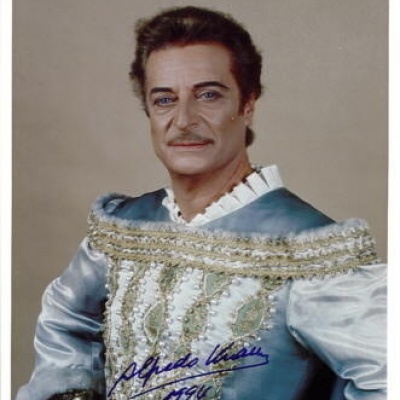
Alfredo Kraus
A.克劳斯(Alfredo Kraus,1927-1999年),西班牙男高音。师从济帕特学习声乐,1956年29岁才在都灵首演,演唱威尔第的歌剧《茶花女》中的阿尔弗莱德,获得成功。翌年就应邀请在科文特花园歌剧院、斯卡拉歌剧院、大都会歌剧院回演出。 A.克劳斯技巧全面,能唱意、法、德等不同风格的歌剧,最擅长的是19世纪的古典美声作品,如《爱的甘醇》和《清教徒》。他的高音能力出色,高音可唱到D2,在表现罗西尼《威廉·退尔》的19个高音C时,显得游刃有余。同时期的帕瓦罗蒂、多明戈等人叱咤歌坛时,克劳斯却以纯正的声乐唱腔吸引行家的欣赏。他的法语歌剧是一绝,意大利戏码又典雅纯正,特别的是克劳斯绝对不会滥用声音,每年演出不超过50场,50年的演唱生涯始终保持优美的高音。他善于表达细腻的感情,换声区的技巧也有口皆碑。他的最佳角色是《维特》中的维特。 A.克劳斯与卡拉斯、斯科托、西尔斯合作的《茶花女》,与施瓦茨科普夫、露德薇合作的《女人心》,与斯科托合作的《艺术家的生涯》,都是名录音。 Alfredo Kraus Trujillo (24 November 1927 – 10 September 1999) was a distinguished Spanish tenor from the Canary islands, particularly known for the artistry he brought to opera's bel canto roles. He was also considered an outstanding interpreter of the title role in Massenet's opera Werther, and especially of its famous aria, "Pourquoi me réveiller?" Kraus was born in Las Palmas de Gran Canaria in the Canary Islands of Spain. His father was Austrian and his mother was Spanish. He began his musical career with piano lessons at the age of four, and he sang in the school choir by age eight. His older brother, Francisco Kraus Trujillo, a baritone, studied music and opera alongside him. After refining his technique singing Spanish zarzuela on stage in Madrid and Barcelona, Kraus made his professional operatic debut in Cairo during 1956 as the Duke in Rigoletto, which became one of his signature roles. In 1958, he sang Alfredo at the Teatro Nacional de São Carlos in Lisbon in a production of La traviata with Maria Callas, a live recording of which was later released. Kraus made his Covent Garden debut as Edgardo in Lucia di Lammermoor in 1959 and his La Scala debut as Elvino in La sonnambula in 1960. He made his American debut with Lyric Opera of Chicago in 1962, and his Metropolitan Opera debut in 1966 in Rigoletto, the role of his last performance there in 1994. In subsequent decades, Kraus extended his repertoire to include more Italian operas such as Lucrezia Borgia, La fille du régiment, Linda di Chamounix, Don Pasquale and La favorita by Donizetti; and French operas such as Roméo et Juliette, Les contes d'Hoffmann, Faust and Lakmé, while continuing to sing his hallmark roles of Werther and of Des Grieux in Manon. He also recorded a number of rarely performed French operas including La jolie fille de Perth and Les pêcheurs de perles, both by Georges Bizet, and La muette de Portici by Daniel Auber. He also performed in some very well known works, such as Don Giovanni and Faust. Kraus came to be virtually synonymous with such lyric tenor roles as Werther, Faust, Don Ottavio (Don Giovanni), Nemorino, and Arturo. He was also known for his performances of Spanish music, notably many classics from the zarzuela repertoire, which he continued to perform live on stage in Spain until the end of his career, and many of which he recorded complete for EMI Spain as well as for his own label, Carillon. Thanks to his superlative technique and careful husbanding of his vocal resources, Kraus sang onstage until his early 70s. He studied voice technique in Milan with Mercedes Llopart. Kraus was also noted for extremely refined musicianship, accompanied by a seemingly effortless high register. As a result, many opera connoisseurs consider him to be one of the best tenors of the end of the 20th century. He was admired for his cultivated musical education and his complete respect for his chosen profession. His first priority was the integrity of his artistic interpretation of a piece, rather than his formidable range and excellent technique. He performed all over the world, including the Teatro Colón in Buenos Aires, Teatro Municipal in Caracas, Teatro Municipal in Santiago, Chile, Teatro Municipal in Rio de Janeiro, and the Liceu in Barcelona. In 1991, Kraus was awarded the Prince of Asturias Award. In 1997, his home city of Las Palmas opened The Alfredo Kraus Auditorium in his honor. The loss of his wife in 1997 affected Kraus so deeply that he stopped performing for eight months. A proud and strong-willed man, he eventually returned to the stage and to teaching. He said, "I don't have the will for singing but I must do it, because, in a sense, it is a sign that I have overcome the tragedy. Singing is a form of admitting that I'm alive." Kraus died on 10 September 1999 in Madrid, at the age of 71, after a long illness.

